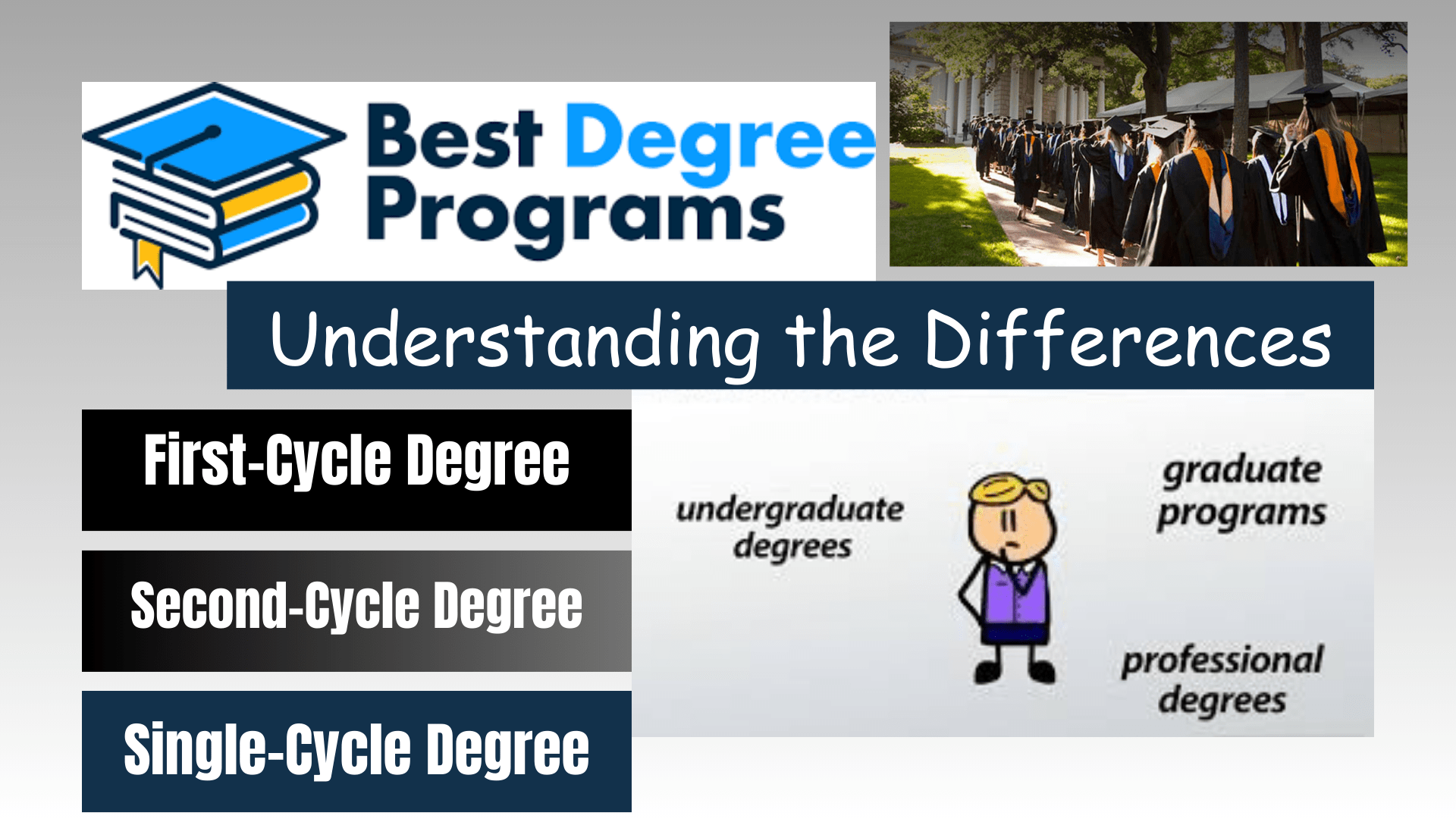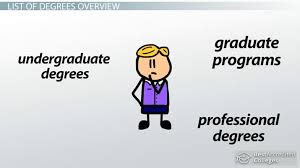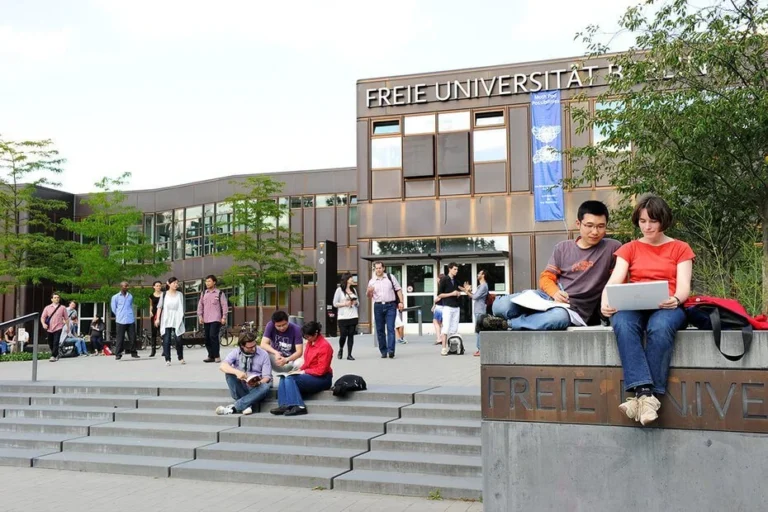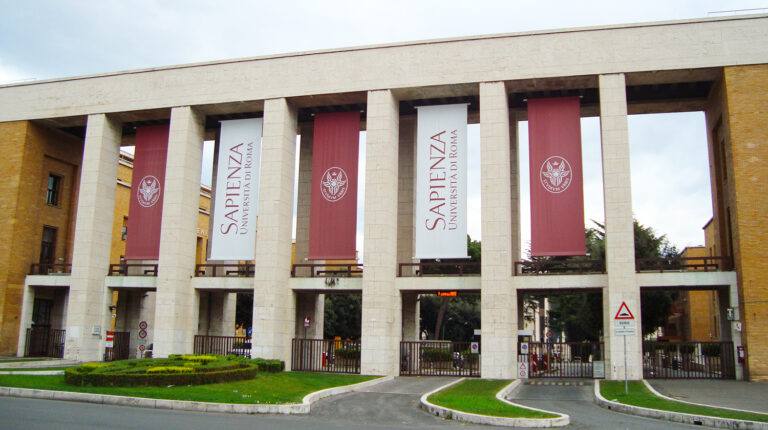

In this article, we will understand the differences between First-Cycle, Second-Cycle, and Single-Cycle Degree Programs. In the world of higher education, there are various types of degree programs designed to cater to different educational needs and career aspirations.
Read Duolingo vs IELTS: Which English Proficiency Test is Right for You?
Among these, three common categories are the First-Cycle, Second-Cycle, and Single-Cycle degree programs. Each of these programs has its own unique characteristics and serves distinct purposes.
In this comprehensive guide, we will explore the key differences between these types of degree programs to help you make informed decisions about your educational journey.
Read Italy Embassy Islamabad Appointments for Visa & Legalization
Introduction


Higher education is a critical phase in one’s academic and professional journey, and choosing the right degree program is pivotal. First-Cycle, Second-Cycle, and Single-Cycle degree programs represent three distinct paths students can take to achieve their academic and career goals. Let’s delve into the details of each to understand their differences and advantages.
Read IMAT 2023 Update: Important Changes, Preparation Tips, or Exam Locations
Difference Between First-Cycle, Second-Cycle, and Single-Cycle Degree Programs
First-cycle degree programs are typically three years long and lead to a bachelor’s degree. These programs provide students with a broad foundation of knowledge in their chosen field. First-cycle degree programs are typically required for admission to second-cycle degree programs.
Second-cycle degree programs are typically two years long and lead to a master’s degree. These programs provide students with more specialized knowledge and skills in their chosen field. Second-cycle degree programs are not required for all jobs, but they can be helpful for people who want to advance their careers or pursue certain professions.
Single-cycle degree programs are typically five or six years long and lead to a master’s degree. These programs are offered in certain fields, such as medicine, dentistry, and architecture. Single-cycle degree programs provide students with a comprehensive education in their chosen field and prepare them for professional practice.
Read How Much Bank Balance is Required for Italy Student Visa
Here is a table that summarizes the key differences between first-cycle, second-cycle, and single-cycle degree programs:
| Criteria | First-cycle degree program | Second-cycle degree program | Single-cycle degree program |
|---|---|---|---|
| Duration | 3 years | 2 years | 5-6 years |
| Qualification | Bachelor’s degree | Master’s degree | Master’s degree |
| Admission Requirements | Secondary school diploma | First-cycle degree | Secondary school diploma |
| Purpose | Provides a broad foundation of knowledge in a chosen field | Provides specialized knowledge and skills in a chosen field | Provides a comprehensive education in a chosen field and prepares students for professional practice |
Read Italy Student Visa Update 2023 & 2024 Requirements
Defining First-Cycle Degree Programs
First-cycle degree programs, often referred to as undergraduate programs, are the initial stage of higher education. These programs typically include Bachelor’s degrees and are designed to provide a broad foundation in a chosen field of study. They usually span three to four years, and students are exposed to a variety of subjects.
Exploring Second-Cycle Degree Programs
Second-Cycle degree programs, commonly known as graduate programs, come after First-Cycle programs and are more specialized. These programs include Master’s degrees and focus on in-depth knowledge and expertise in a specific area. They usually last one to two years, and applicants often need a Bachelor’s degree for admission.
Understanding Single-Cycle Degree Programs
Single-cycle degree programs are a distinct category, primarily offered in some European countries. These programs combine both undergraduate and graduate studies into a single curriculum. Students can earn a degree, such as a Master’s, without the need for a prior Bachelor’s degree.
Read Best Engineering Universities Italy: Study Engineering in Italy
Comparing Program Durations


One of the key differences among these degree programs is their duration. First-Cycle programs typically take three to four years, while Second-Cycle programs usually last one to two years. Single-cycle programs can vary but often span five to six years.
Admission Requirements
Admission criteria differ for each program. First-Cycle programs usually require a high school diploma, while Second-Cycle programs demand a Bachelor’s degree. Single-cycle programs may admit students directly from high school, making them a convenient option for those seeking a seamless educational journey.
Curriculum & Coursework
First-Cycle programs offer a diverse range of courses, including general education requirements. Second-cycle programs have a more specialized curriculum, focusing on advanced topics in the chosen field. Single-cycle programs combine these aspects, providing a comprehensive education.
Read Riveria Vocational School: New Free Vocational School in Finland
Academic Focus & Specialization
Second-cycle programs are known for their emphasis on specialization, allowing students to become experts in a particular area. First-Cycle programs offer a broader academic foundation, while Single-Cycle programs strike a balance between the two.
Thesis or Capstone Requirements
Master’s programs often require students to complete a thesis or capstone project, showcasing their research and analytical skills. This requirement is less common in First-Cycle and Single-Cycle programs.


Potential Career Opportunities
The career opportunities vary depending on the degree earned. First-Cycle graduates often enter entry-level positions, while Second-Cycle graduates are more likely to secure specialized roles. Single-cycle graduates are equipped for advanced career opportunities without the need for additional degrees.
Read Cheapest University in Canada for International Students
International Recognition
Second-cycle degrees are widely recognized globally, making it easier for graduates to pursue international career opportunities. First-Cycle and Single-Cycle degrees may have varying levels of recognition based on the institution and country.
Flexibility & Mobility
First-Cycle programs provide flexibility for students exploring different academic interests. Second-cycle programs require a higher level of commitment to a specific field. Single-cycle programs offer the flexibility of a broader education with the potential for specialized studies.
Tuition & Financial Considerations
Tuition costs vary among these programs, with Single-Cycle programs often being more cost-effective due to their combined nature. Scholarships and financial aid options are available for each program type, depending on the institution.
Student Experience
The student experience can vary based on the program type and institution. First-Cycle programs often focus on a vibrant campus life, while Second-Cycle and Single-Cycle students may have a more research-oriented experience.
Read ERGO Scholarship Italy 2023-24 Apply Online | Requirements | Benefits | Deadline
Differences in the European Higher Education Area


In the European Higher Education Area, university studies are divided into three cycles: First-cycle and Single-cycle degree programs, Second-cycle degree programs, and Third-cycle degree programs.
First-cycle degree programs are also known as undergraduate programs. They are offered during the first three years of university studies and can result in a Higher Education Diploma, a Bachelor’s degree, or a professional qualification. The first-cycle degree program requires students to acquire 180 educational credits (CFU) in a maximum of 20 exams.
Read University of Ferrara Apply Online Admission 2023-24 | No Application Fee | Without IELTS
Single-cycle degree programs are also known as combined Bachelor’s and Master’s programs. They are offered in fields such as Architecture, Chemistry and Pharmaceutical Technologies, Pharmacy, Law, Building and Architectural Engineering, Primary Teacher Education, Veterinary Medicine, Medicine and Surgery, Dentistry and Dental Prostheses. Single-cycle degree programs require students to acquire 300 credits for some fields and 360 credits for others.
Second-cycle degree programs are also known as graduate programs. They are offered after the completion of a first-cycle degree program. Two types of second-cycle degrees are offered: a one-year Master’s degree or a two-year Master’s degree.
Third-cycle degree programs are also known as doctoral studies (PhD) and Specialisation Schools.
The qualifications awarded for first cycle degrees is Dottore (in Italy), while for second cycle degrees is Dottore magistrale (in Italy). The academic qualification awarded for third-cycle degrees is PhD (doctor), while for Specialisation Schools is Specialist 1.
Read Canada Student Visa: Is it Worthwhile to Study in Canada as an International Student?
Duration of Each Cycle of University Studies
The duration of each cycle of university studies varies depending on the country and the type of degree program. In Sweden, for example, the first cycle degree program lasts for three years, and at the end of your studies, you will obtain a “Dottore” qualification.
The second-cycle degree program is offered after the completion of a first-cycle degree program. Two types of second-cycle degrees are offered: a one-year Master’s degree or a two-year Master’s degree. The third cycle degree program is also known as doctoral studies (PhD) and Specialisation Schools.
In Italy, the first cycle degree program requires students to acquire 180 educational credits (CFU) in a maximum of 20 exams. The duration of a single-cycle degree program varies depending on the field of study. For example, it takes six years to complete a single-cycle degree program in Medicine and Surgery.
In general, the duration of each cycle of university studies depends on the country, the type of degree program, and the field of study.
Read University of Milano Bicocca Admission 2023-24| No Application Fee | Without IELTS
Which Type of Degree Program is Right for You?
The type of degree program that is right for you depends on your individual needs and goals. If you are just starting out with your education, then a first-cycle degree program may be a good option for you.
If you have already completed a first-cycle degree program and want to specialize in a particular field, then a second-cycle degree program may be a good option for you. If you are interested in a profession that requires a master’s degree, such as medicine or law, then a single-cycle degree program may be a good option for you.
It is important to note that the specific requirements for first-cycle, second-cycle, and single-cycle degree programs may vary depending on the country and institution. It is always best to contact the institution you are interested in to learn more about their specific requirements.
Read When Do I Need to Apply for a University in Europe?
Conclusion
In summary, the choice between First-Cycle, Second-Cycle, and Single-Cycle degree programs depends on your academic and career goals. Consider factors such as program duration, specialization, admission requirements, and potential career opportunities when making your decision. Each path offers unique advantages, and the right one for you will align with your aspirations.
Now that you have a clearer understanding of the differences between First-Cycle, Second-Cycle, and Single-Cycle degree programs, you can confidently navigate your educational journey. Remember that the choice you make today can significantly impact your future career opportunities and personal growth.
Read Move To Canada for Free With Just $500 – NBCC (New Brunswick Community College)
FAQs
1. Can I switch from a First-Cycle program to a Second-Cycle program?
Yes, many students pursue Master’s degrees after completing their Bachelor’s.
2. Are Single-Cycle programs available worldwide?
No, Single-Cycle programs are more common in certain European countries.
3. Do Single-Cycle programs save time compared to traditional paths?
Yes, they can be a more time-efficient way to earn advanced degrees.
4. Are scholarships available for Second-Cycle programs?
Yes, there are numerous scholarship opportunities for graduate students.
5. What if I’m still unsure which program is right for me?
Seek guidance from academic advisors and career counselors to make an informed decision.







3 Comments